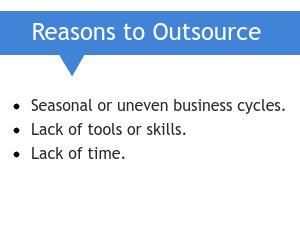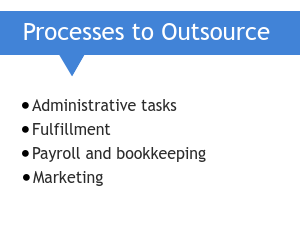
Memo: You Can’t Do It All
We can’t do everything. If we could, interviewers wouldn’t need to ask us about our greatest weaknesses. But in business, weaknesses can be costly—creating lost revenue, wasted hours and disappointed customers.
Unless you’re in the minority of small business owners, certain aspects of running a company are more difficult for you—or they require more daylight hours than you can spare at the moment. You may struggle with tasks as small as managing your email inbox or as large as shipping products to your customers across the country.
The solution: Consider outsourcing whatever it is you struggle with. It often pays to outsource—literally. Finding a contractor to take on the work that slows you down can help improve your company’s flexibility, eliminate bottlenecks in your workflow and reclaim the precious hours you’ve been spending on these tasks. As phrased in a post by Neil Patel on the Entrepreneur blog, “You can’t do it all alone.”
Outsourcing can also help you move closer to that “work-life balance” you’ve been chasing for years, but have never managed to find.
The Pros: Why You Should Consider Outsourcing
Consider this: 38% of small business owners work more than 49 hours each week.
Trusting a key part of your business to an outside entity may sound like something you’d never consider. It’s normal to want to oversee every moving part of your company, but one of the most important qualities of any leader is recognizing their own shortcomings.
You can’t be a whiz at every single aspect of modern business and outsourcing can help you painlessly bridge any gaps in your own knowledge. It’s a matter of working with people whose greatest strengths match up perfectly with your greatest weaknesses.
Here are some key reasons why outsourcing might be advantageous:
- Seasonal or uneven business cycles —If your business fluctuates, depending on the time of year or the season, it probably won’t be cost-effective to maintain and staff your own private warehouse. You can save time and money if you outsource the processes, like warehousing and fulfillment that you don’t use every day.
- You don’t have the equipment —Depending on your line of work, your future may include expensive equipment if you intend to keep scaling your business. Wouldn’t you rather pour that money into research and development?
- You’re simply too busy —An entrepreneur’s life is never dull. If you’re in the early stages of launching your business, you lack more than the physical infrastructure—you probably also lack the mental bandwidth required to oversee every facet of your operation effectively. Give yourself (and your sanity) a break.
The Cons: When You Shouldn’t Outsource
There are also several instances in which you might not want to consider working with an outside contractor for outsourcing. Those reasons depend on your needs and the type of business you’re running. If it’s too costly or causes you to lose too much control, you may want to reconsider.
If your business has an extremely limited cash flow, it doesn’t make sense to add another line item to the budget. Outsourcing is for operations large enough to turn a semi-reliable profit—it may not be a fit during the early stages of development. Until you’re turning a steady profit, it makes more sense for you to oversee your existing operations with your current staff and equipment. In time, you can grow your budget to make room for outsourcing.
Outsourcing isn’t always a great fit for niche or super-specialized businesses either. It’s certainly possible that the product you provide cannot be easily manufactured or processed by a general-purpose outsourcing contractor or with standard equipment. Be sure to consider the learning curve. If bringing a third party up to speed with how you do things would take more time than you’re willing to spend, skip it for now and continue doing the work yourself. You can always outsource other aspects of the process, like marketing or fulfillment.
Areas That Are Ideal for Outsourcing
Now that we’ve got the disclaimers out of the way—you might find yourself thinking that outsourcing might be a great idea for your growing company—but where should you start?
Here are four key business areas you can consider entrusting to a third party:
1. Administrative Tasks
One of the most significant drains on your time as a business owner is likely the daily tedium of administrative tasks. Monotonous work can chew up minutes or even hours of each day, sometimes at key moments when you have more important things to do, accomplish or oversee.
You’d probably rather focus on the things that actually grow your business—right?
Many business owners hire virtual assistants who work only when you need them—helping you eliminate troublesome time sinks, such as processing and replying to emails, creating employee schedules and organizing your own to-do list and calendar appointments.
Between 2005 and 2012, telecommuting in the United States grew by nearly 80%—with remote workers accounting for 34% of the American workforce. These statistics imply that many jobs can be completed remotely. It also means that, as a business owner, you can easily work with someone living on the opposite coast or even the other side of the world. Your talent pool today is exponentially larger than it was a decade or two ago, which means there’s somebody out there who wants to handle your administrative duties—and they’re probably really good at it, too.
2. Fulfillment
Delivering on your business promises is arguably the most important part of running a successful company. But delivery itself—of services, products or personnel—probably isn’t your passion. You likely want to be inventing, innovating and managing. So why not consider outsourcing fulfillment?
An outsourced fulfillment company can help you keep your promises to your customers by picking and filling orders on time, overseeing shipping procedures, managing inventory and connecting your company at point A with your customers at point B. You’ve probably seen this trend in action yourself if you’ve ever shopped on Amazon.com. If you see “fulfilled by Amazon” beside a product, that’s an example of fulfillment outsourcing.
Click here to read more about outsourced fulfillment companies
In general, fulfillment companies perform one or perhaps all of the following tasks: storing, receiving, processing, packaging, sending and (if necessary) returning products. There are many advantages of outsourcing fulfillment, including:
- Avoiding long-term leases —By contracting with a third-party warehousing service, you can free up valuable real estate and continue to grow your company without the need for more physical workspace.
- Less staff to hire and manage —Taking on additional staff members is a costly endeavor, in terms of both time and money. Outsourcing your backend processes can save you quite a bit of both.
- Become more efficient —Fulfillment isn’t your main business, but it is for other companies out there. By outsourcing, you can take advantage of these their efficiencies.
No matter how large or small your operation is, fulfillment outsourcing might be a good way to go. When outsourcing, you generally only pay approximately 10% of the sales price plus shipping costs. In most cases, that’s less than the cost of a warehouse and the associated costs.
3. Payroll and Bookkeeping
Some folks like to brag about being able to multitask, but recent research suggests this practice can actually do more harm than good. According to the American Psychological Association, juggling more than one project at a time might actually worsen productivity by 40%. When you multitask, your projects tend to take longer than they would normally—and you introduce new possibilities for human error.
Still not convinced? Consider this: Unnecessary multitasking carries a price tag of $400 billion globally each year.
Multitasking is supposed to make your life easier, rather than harder, and it should reduce errors rather than compound them, which means high-stakes tasks, like payroll and bookkeeping, should definitely be among your first considerations for outsourcing.
Providers like Wagepoint make it easy and affordable for small business owners to entrust their payroll tasks to independent contractors who stay current with changing state and federal regulations. Many bookkeepers and accountants have also gone online, offering flexible, affordable solutions from the cloud.
4. Marketing
Lead generation is a huge part of the modern business and, with communication technology being what it is today, it requires a mastery of social media, search engine optimization (SEO), keyword research and many other skills that are, themselves, full-time jobs.
Search Engine Land estimates that the current average conversion rate across the entire World Wide Web is a paltry 2%. That’s pretty weak and it doesn’t get much better: If you take a look at just the top 25% of websites, their conversions rise to only 5% or so.
What does this mean? For starters, it might mean you’re leaving money on the table. Your job is to provide your customers with excellent products, while continually and incrementally improving the apparatus that produces those products. But getting your business out into the world and in front of receptive eyes is its own branch of science all to itself—and a huge time hog if you don’t know what you’re doing.
Consider outsourcing content marketing and lead generation. By contracting with a PR firm or internet marketing company, like Web Profits, you can easily boost your reach. Even small boosts can net big gains for your bottom line. Consider, for example, the advantage of ranking on the first page of Google search results instead of the second or third—that’s the power of outsourced lead generation.
Key Takeaway — Know Yourself and Know What to Outsource
The common thread here is this: Small businesses that choose outsourcing can spend more time on the things they’re good at and cut down or eliminate time spent on things they’re not so good at. Take an honest look at your strengths and determine which weaknesses cause the most slowdown. There’s likely somebody out there who can partner with you and handle the distractions that are holding you back.
Are you multitasking even while reading this article? Share your experiences with outsourcing in the comments below. We promise not to outsource the answers.
 Author: Marketing specialist and the founder of the career and lifestyle advice blog Punched Clocks (www.punchedclocks.com), Sarah Landrum is a business and career expert with a passion for writing. Between posts, Sarah spends her time chasing her dogs through the yard and DIYing her home.
Author: Marketing specialist and the founder of the career and lifestyle advice blog Punched Clocks (www.punchedclocks.com), Sarah Landrum is a business and career expert with a passion for writing. Between posts, Sarah spends her time chasing her dogs through the yard and DIYing her home.














